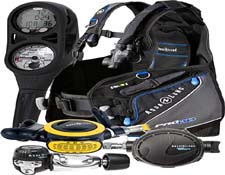

|


|
 |
 |
 |
 |
 |
 |
 |
 |



|
Fiji Islands More then anything else, Fiji is an exotic destination. It's the exhilaration of a dolphin arching high into the air beside your boat; the long gliding swoop of an orange dove through the rainforest; the smiles of excited children performing in unison to the beat of a hollow log drum. Our 333 islands can sizzle with excitement or murmur with the quiet calm of pristine nature. Where else can you swim with huge, harmless manta rays congregating by the shore, snorkel over giant rainbow gardens of soft coral, or scuba dive the White Wall and famous Astrolabe Reef. Fiji is where the Cloud Breaker, the incredible six-metre wave found offshore at Tavarua, draws surfers from around the world. It is also where you can float in the calm, quiet waters of a turquoise lagoon at sunset or walk alone through lush rainforest. It is where the sun shines almost everyday and when it does rain, people rush outside for a rainbath in the warm, brief downpour of a tropical shower which ends as quickly as it began. This is where life is lived for the joy of it all, where rushing is rude, and the name of a new friend is never forgotten. Fiji is where people wear flowers tucked in their hair, not to impress visitors, but because they like to. The Fiji archipelago is at the cross roads of the South Pacific. In the days of sailing ships it was known as The Cannibal Isles and carefully avoided by mariners because of its fierce warriors and treacherous waters. However, in the age of jumbo jets and global travel. Fiji has become the central hub of the exotic South Pacific. More than 85 flights land at Nadi on the main island of Viti levu every week. From there it is only a quick seven minute hop to one of the offshore island resorts, or less than an hour of flying time to Vanua Levu or Taveuni, the second and third largest islands, where then outside world is quickly left behind For those who like to keep their feet on the ground once they arrive, the big island of Viti Levu offers a wealth of tropical scenery, from rushing mountain rivers and waterfalls in the depths of the rainforest, to palm-fringed beaches where time seems to stop. This is where you can fish from the reef in the morning, picnic at the edge of a waterfall plunging into a rocky jungle pool at midday and eat native food cooked in an earth oven in the evening, and then dance to the beat in a swinging discotheque until long after midnight. Along with it's pristine tropical beauty, Viti levu offers several large towns and the bustling capital of Suva, a shopper's paradise and you will never have to travel more than a few hours to get anywhere on the island. Airports Fiji has two international airports - Nadi, the principal gateway and Nausori, near Suva. Customs At International Airports Fiji Customs operates a Dual Channel System - the Red and Green Channels - for expeditious clearance of air travellers. If you have any prohibited or restricted goods, or dutiable goods exceeding your duty/VAT free concessions, you should seek Customs Clearance at the Red Channel. If you do not have any prohibited, restricted or commercial goods, or dutiable goods exceeding your Duty/VAT concessions, you should proceed through the Green Channel. Note: Your baggage may be examined by Customs whether you take the Red or Green Channels. If this occurs, you will be required to open and repack your baggage. Dutiable Goods Fiscal duty and VAT are levied on all goods in excess of concessions. Fiscal duty rates vary depending on the goods, whereas VAT is uniformly applied at 10%. VAT is applied on a base which includes the value of the goods plus any fiscal duty payable. Duty/VAT Free Concessions A bona fide passenger finally disembarking in Fiji is entitled to the following DUTY and VAT free concessions: Dutiable goods accompanying passengers (other than alcohol and tobacco products ) not exceeding $F400 in value The following goods which are owned by passengers and are not intended as gifts or for sale: Personal Effects Household effects for returning residents ( must be used for 12 months prior to departure ) or intending residents. Articles taken out of Fiji on departure on which duty and tax have been paid The goods should not be for sale and must be accompanied at the time of final disembarkation by the passenger. Alternatively, the passenger purchases the goods immediately after final disembarkation in Fiji. Each passenger of 17 years or more may also bring the following goods into Fiji, duty and VAT free, provided they are accompanied and are not for sale: Alcohol - 2 litres of alcohol liquor, or 4 litres of wine, or 4 litres of beer, or any combination that does not exceed the prescribed limit for any one item. Tobacco products - 500 cigarettes, or any combination of tobacco products up to 500 grams net weight. A Baggage Declaration Form is to be filled and signed by the bona fide passenger in the case of unaccompanied luggage. Departure Tax Visitors to Fiji are required to pay $20.00 departure tax in Fijian currency following check-in. Children under 12 are exempt Entry Fiji welcomes visitors and to facilitate easy entry, everything has been done to make the process as pleasant as possible. A valid passport for at least three months beyond the intended period of stay and a ticket for return or onward travel is required. Entry visas are granted on arrival for a stay of 4 months for nationals of:
Nationals of other countries require prearranged visas, which can be applied for at the nearest Fiji High Commission in their respective country. Visas may be extended for up to six months on application to the Department of Immigration in Suva, Lautoka or Nadi. It is necessary to have an onward or return ticket and sufficient funds. Those wishing to stay more than six months should consult the Department of Immigration. Those wishing to reside and work in Fiji, even on a temporary basis, require proper authority to do so before arrival. In most cases, prospective employers who make the necessary arrangements sponsor such people. Fiji is noted as one of the friendliest places in the world, but visitors who intend to reside, or to reside and work, must make certain they have satisfied immigration requirements. Geography Fiji is ideally located in the tropics of the southern hemisphere. It lies on the 180 Meridian where the dawning of each new day occurs. Over 300 islands make the Fiji group of islands with a total land area of just 18,272 square meters. Of the 300 islands, only a 100 or so islands are inhabited by humans and the rest are left as nature reserves. Area Covered Latitude: 12°-21°S and Longitude: 176°E-178°W. The two major islands in the group are known as Viti Levu and Vanua Levu. Almost 80 percent of the population live on these two islands. Still the majority of the population live in the rural areas and the outer islands. Only about 40 percent of the population live in urban areas. Communications Most hotels have direct dialling facilities. Check with the operator for long distance and international charges, which may also be found in the telephone directory. Please note that the international country IDD code for Fiji is 679. There are no area codes. Thus, when dialling any part of Fiji from overseas the procedure would be: access code (679) plus the Fiji subscriber number. Mobile Communication Vodafone Fiji Limited, a subsidiary of Telecom Fiji Ltd, operates a GSM digital mobile communication service. It has roaming agreements with Australian (GSM) operators namely Telstra, OPTUS and Vodafone Pty, and New Zealand operator - BellSouth plus UK operator Vodafone Ltd UK. All mobile customers are advised to check with their network operators for their roaming status before travelling to Fiji. Typical Expenses Here is an idea of the average cost of goods and services. The values stated in Fijian dollars.
Tipping Tipping is not encouraged in Fiji and it is left to the individual to determine whether to make a gratuity. Some resorts operate a staff Christmas fund. Though tipping is not a local custom, you will find local people tipping. This has as much to do with social attitudes as it does recognition of the excellence of service. Fijians ritually exchange gifts of food, clothing, "yaqona", "tabua", kerosene, and even money during important social occasions, so that tipping can be seen in the light of sharing. It can denote a person of affluence who is generous. But it must be emphasised that at all times it is a question of individual choice. Agriculture Quarantine Fiji is a country which carefully guards itself against human, animal and vegetable pests and diseases. It is free of all the serious plant and animal pests and diseases and it wants to maintain this privileged state. The importation of vegetable matter, seeds, or any animal product is prohibited without the relevant import permits from the Ministry of Agriculture, Fisheries and Forests. A permit is required also for the importation of cats, dogs and other live animals. Such animals will require to be kept in quarantine isolation on arrival. The length of such isolation periods will depend on the country of origin of these animals. Quarantine officers are stationed at the international airports at Nadi and Nausori and the ports of entry for vessels. Fiji is a signatory to the Convention on International Trade in Endangered Species of Wild Flora and Fauna ( CITES ). Tourists are required to obtain an export permit and CITES certificate from the Ministry of Agriculture, Fisheries and Forests to enable them to take the following aquatic products out of the country: coral of any species, turtle shells of any species, shell of any species of giant clams, whales tooth. Health Quarantine Fiji is free from malaria, yellow fever and major tropical diseases that are endemic to most tropical countries. It has an effective medical system in place although local people still believe in the efficacy of age-old herbal remedies. Fresh water reticulated in Suva, Lautoka and the other major towns has been treated and is safe to drink from the tap. This also applies to hotels and resorts. Some resorts use artesian water for bathing, but provide drinking water separately. If this is the case, visitors will be advised. Vaccinations Yellow Fever and Cholera vaccinations are only required if coming from an infected area as designated by the World Health Organisation. Yellow Fever vaccination certificate is required for travellers over I year of age coming from an infected area. Attire Visitors to Fiji should bring a light tropical wardrobe. Bathing suits, shorts, T-shirts and as they will soon discover "sulus" (known also throughout the Pacific as pareau, lavalava or sarong) are a must for both men and women. The wrap-around "sulu" is Fiji’s most distinctive and versatile form of dress. It is women who obtain the most benefit from the "sulu". There are at least ten different ways in which it can be used, even for evening wear. Ask your resort staff for hints on tying and wearing your "sulu". Visitors are asked to be careful not to offend local sensibilities. Wearing bikinis and ultra-brief, swimming costumes is fine at the resort but not when visiting villages or shopping in town. At such times it is easy to take a sulu to use as a wrap-around so no offence is caused. Both men and women should be careful to respect local feelings. Banking Fiji is well represented by banking groups. These include: The Australia and New Zealand Banking Group (ANZ), Bank of Baroda, Bank of Hawaii, Habib Bank, National Bank, and Westpac Banking Corporation. All groups have head offices in Suva with branches and agencies throughout Fiji. Normal banking hours are from 9:30am to 3:00pm Monday to Thursday and to 4:00pm on Friday. All banks are closed on Public Holidays. ANZ operates a 24 hour service at Nadi International Airport’s Arrivals Concourse. Bank of Hawaii offers Automated Teller (ATM) Services in Suva, Nadi, Lautoka. ANZ offers ATM services in Suva, Nausori, Nadi, Nadi Airport, Lautoka, and Labasa. National Bank and Westpac offer EFTPOS services in Suva, Nausori, Sigatoka, Nadi, and Lautoka. Currency Click Here For Currency Exchange The Fijian dollar is the basic unit of currency, available in denominations of $2, $5, $10, $20, $50. Coins: 1c, 2c, 5c, 10c, 20c, 50c and $1. There is no limit to the amount of money to be brought in. Visitors are allowed to take out currency up to the amount imported. Credit Card Major credit cards are welcomed by most hotels, restaurants, shops, rental car agencies, tours, cruises and travel agents. American Express, Diners Club, Visa, JCB International and Mastercard, are represented in Suva. American Express and VISA can replace lost credit cards and travellers cheques. Religion A multiracial, multicultural nation, Fiji is represented by major religions of the world. Visitors will see Christian churches, Mosques, Sikh and Hindu temples in the towns and the countryside. The majority of Fijians are of the Wesleyan persuasion, but all the other Christian denominations are represented. Visitors are welcome at Sunday worship throughout the Fiji Islands Electricity The electrical current in Fiji is 240 volts AC 50 Hz. Fiji has three pin power outlets identical to Australia and New Zealand. If your applications are 110v check for a 110/240v switch; if there is none you will need a voltage converter. Leading hotels and resorts offer universal outlets for 240v or 110v shavers, hair dryers, etc. Postal & Telephone Service Post offices are open 8am to 4pm Monday through Friday except in Suva where it closes at 4:30pm. Of course, our phone service is modern with direct or operator-assisted dialling |
| DiveGuide.com Scuba Diving Vacations & Dive Holidays - Book direct dive travel with scuba diving operators, resorts, dive liveaboard yachts and dive travel representatives worldwide. We provide free scuba diving information for the traveling diver on vacation and holiday in and to scuba diver destinations around the world. |












|